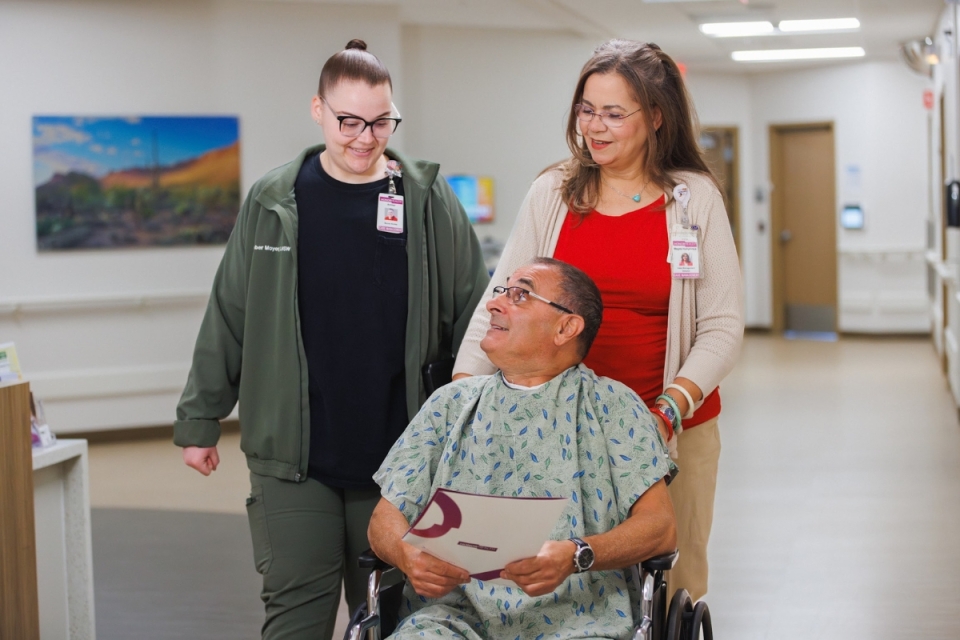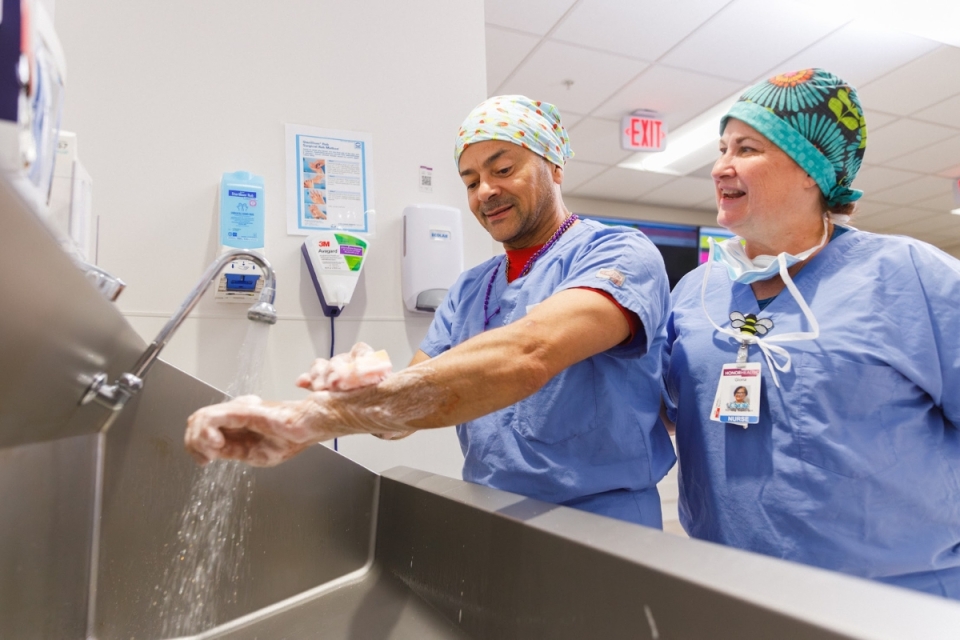Surgery preparation and recovery
At HonorHealth, we want you to feel informed, comfortable and confident as you prepare for your upcoming surgery. Knowing what to expect can help ease any worries and ensure a smooth experience from start to finish.
This page guides you through every step of your surgical journey – from preparing for surgery to your recovery afterward. To make things easier, we’ve included helpful buttons below that let you jump directly to the information you need.
Please note: It’s important to start reviewing the “Before surgery instructions” at least one week before your procedure. This gives you time to safely stop certain medications and make any necessary arrangements, helping prevent delays on the day of your surgery.
Before day of surgery
Preparing for surgery can be stressful. In this section we’ve outlined everything you need to help you feel prepared – from showering the night before, important information on smoking, vaping and drinking alcohol and more.
Medication and pre-procedure instructions
Before your surgery, complete all required testing and consultations as directed by your surgeon and during your pre-admission testing (PAT) visit. Be sure to follow all instructions from your surgeon, PAT nurse, and care team – including guidance on when to stop eating and drinking before your procedure. It’s also important to review your medications in advance, since some may need to be paused before surgery.
Not following these instructions could delay or even cancel your procedure.
If you’re having trouble getting in to see your primary care physician, or you don’t have one yet, and your surgeon needs you to have an evaluation, the HonorHealth Pre-Surgical Evaluation Clinic - Pima Center can help you get ready.
For more details to help you prepare, review the documents listed below for specific pre-surgery instructions and tips:
- Getting ready for your surgery
English | Spanish (PDF)
- Special instructions for patients with diabetes
English | Spanish (PDF)
- Pre-surgery bathing instructions
English | Spanish (PDF)
- Cannabis use before surgery
English | Spanish (PDF)
- Smoking and vaping before surgery
English | Spanish (PDF)
- Vitamins and supplements use before surgery
English | Spanish (PDF)
- Heart surgery
English | Spanish (PDF)
Planning for transportation and caregiver arrangements
It’s highly recommended for your safety that you have an adult stay with you for the first 24 hours after your procedure. Please make arrangements for this ahead of time.
At HonorHealth, your safety comes first. To help keep you safe and comfortable after your procedure is complete:
- Our hospital policy requires that a responsible adult (18 years or older) drives you home after your procedure.
- If you plan to use a taxi or rideshare, another responsible adult (besides the driver) must ride with you.
- The only exception is if your procedure uses local anesthesia only.
Can’t find someone to drive you? No worries!
In collaboration with Onward and Veyo, HonorHealth offers non-emergency medical transportation (NEMT) services, so you can get home safely without needing another adult to accompany you. Visit their websites to learn more about their services, and how to schedule a ride.

Please notify the Pre-admission Testing Department immediately if you:
- Are sick or feeling ill (fever, cough, congestion, etc.)
- Were exposed to COVID-19 or are showing symptoms in the past 14 days
- Notice a rash or open wound near the surgical site
- Came into contact with fleas, bed bugs, lice or scabies
View pre-admission testing contact information for each campus.
Enhanced Recovery After Surgery (ERAS)
ERAS is a personalized care plan designed by your HonorHealth surgery and anesthesiology teams. Your surgeon will let you know if your surgery follows this plan and provide instructions tailored to you.
Some ways ERAS may differ from previous surgeries:
- You may be asked to drink clear liquids up to a certain time on the day of surgery.
- You might be asked to have a carb-load drink, like Ensure Pre-surgery or Gatorade, at a time your surgeon specifies.
- Non-narcotic oral pain medications may be given before surgery to reduce the need for stronger pain medications afterward.
- Anti-nausea medication may be given before and during surgery to prevent post-surgery nausea.
For more information, please review our ERAS general overview guide English | Spanish (PDF).
Guidance for your upcoming procedure
If you are having one of these types of surgeries and your surgeon wants to follow the ERAS care plan, please review this information to help you prepare:
See the HonorHealth disclaimer.
Visitor information and parking
HonorHealth has visitation guidelines in place to protect our patients, caregivers and visitors. These may change during respiratory and flu season, including temporary age-related restrictions for children. Please review our current guidelines on the visitor information page before your surgery so you know what to expect and can plan ahead.
For campus maps, please check out our hospital location pages:
- HonorHealth Scottsdale Shea Medical Center
- HonorHealth Scottsdale Osborn Medical Center
- HonorHealth Scottsdale Thompson Peak Medical Center
- HonorHealth John C. Lincoln Medical Center
- HonorHealth Deer Valley Medical Center
- HonorHealth Four Peaks Medical Center
- HonorHealth Tempe Medical Center
- HonorHealth Sonoran Crossing Medical Center
- HonorHealth Florence Medical Center
Construction updates at HonorHealth medical centers
We’re making improvements to several of our facilities to continue delivering exceptional care to our communities. Ongoing construction may affect parking and entrances. Please follow the posted signs and allow a little extra time for your visit.
Day of surgery
Here’s what to expect and how to prepare so your surgery day goes as smoothly as possible:
Follow your instructions
Follow any day-of-surgery guidance from your surgeon or pre-admission testing (PAT) nurse. It helps keep everything on schedule and prevents delays.
Check in
- You will check in at Admitting when you arrive.
- You will get a name band.
- You may wait in the surgery waiting area until you are called to pre-op.
- Loved ones will wait nearby but will see you again before surgery starts.
Arrive on time
Your surgeon’s office will give you your exact arrival time, as this can vary by procedure. If you’re unsure of your arrival time or have questions, please contact your surgeon’s office directly.
Pre-op preparations
- An IV line may be placed for medications.
- Your surgical site will be cleaned and prepped.
- You will sign consent forms.
- You will meet your surgeon, anesthesiologist and surgery team.
- Ask questions and let the team know who should get updates on your condition.
Clothing
- Wear loose-fitting clothes and flat shoes to make changing and moving easier.
- If you’re having breast surgery, bring a supportive sports bra.
- For surgeries on the breast, shoulder, arm, chest or head, choose a button-down shirt so you don’t have to lift your arms to get dressed.
What to bring
- Your insurance card, photo ID and a form of payment.
- Glasses and/or hearing aids if needed.
- If you’re staying overnight, pack a small bag with essential travel-size toiletries and personal items (phone charger, lip balm, etc.). A toothbrush and toothpaste are provided.
- Small valuables can be stored with our Security office during your procedure.
- If you have a living will or medical power of attorney, bring a copy.
What not to bring
- Electronics, jewelry (including wedding bands and body piercings) or contact lenses.
- Medications, unless specifically instructed.
- Any valuables or unnecessary personal items. Personal belongings you keep with you are your responsibility and not the hospital’s.
During your surgery
Your care team will be with you from start to finish, keeping you safe and comfortable in the operating room.
Anesthesia
You may be asleep, unaware of the procedure and free from pain. You might also receive medicine to prevent nausea. Your surgeon and anesthesiologist will choose the best type of anesthesia for you. Common options include:
- General: Completely unconscious, no awareness or pain.
- Regional: Only the area of surgery is numbed.
- Local: A specific location is numbed with an injection.
- Procedural sedation: You’re conscious but may not be aware of what’s happening, and you won’t feel pain or anxiety.
Staying safe and comfortable
Your care team will make sure you are cozy and well cared for throughout your procedure. They will keep you warm with blankets, warm IV fluids and air warmers, and manage your pain to help your recovery start smoothly. Controlling pain helps you:
- Feel more comfortable while healing.
- Move sooner, which reduces the risk of complications like pneumonia or blood clots.
- Recover faster and get better overall results.

After your surgery
From the moment your procedure ends, your care team works together to help you wake up comfortably, feel supported and understand what comes next.
In the recovery room
In the recovery room, your nurses and anesthesia team will focus on keeping you safe and comfortable as you begin to wake up. While family can’t join you in this area to protect everyone’s privacy, your team will keep your loved ones updated, so they’ll know exactly how you’re doing.
Once it’s safe, we’ll guide you to the next step, whether that’s heading home with easy-to-follow recovery instructions or settling into a hospital room where your healing can continue with us.
If you are staying with us:
Your surgical team will decide when it is safe to move you to a hospital room. Once your recovery room nurse knows what unit and room number you will be in, they will share this information with the person you designated.
The medications used during surgery increase your risk of falling. It is very important to use your call light for help after surgery.
If you are going home:
Your surgical team will decide when it is safe enough to send you home. They will go over any instructions with you or the person you designate.
Activities after surgery
Standing, walking, coughing and deep breathing reduce your chances of developing an infection, pneumonia, blood clot or other complications. They also speed up your recovery.
Safely caring for your catheter at home
After your surgery, your doctor may send you home with a urinary catheter – a flexible plastic tube that drains urine from your bladder into a bag. Our goal is for you to be as safe and comfortable as possible while caring for your catheter, and the following video will walk you through each step of doing so.
HonorHealth Disclaimer
The contents of the packet such as text, graphics, images, and other material are for informational purposes only. The content is not intended to be a substitute for professional medical advice, diagnosis, or treatment. Always seek the advice of your physician or other qualified health provider with any questions you may have regarding a medical condition. Never disregard professional medical advice or delay in seeking it because of something you have read in this packet.
If you think you may have a medical emergency, call your doctor or 911 immediately. HonorHealth does not recommend or endorse any specific tests, physicians, products, procedures, opinions, or other information mentioned in this handbook. Reliance on any information provided by HonorHealth is solely at your own risk.